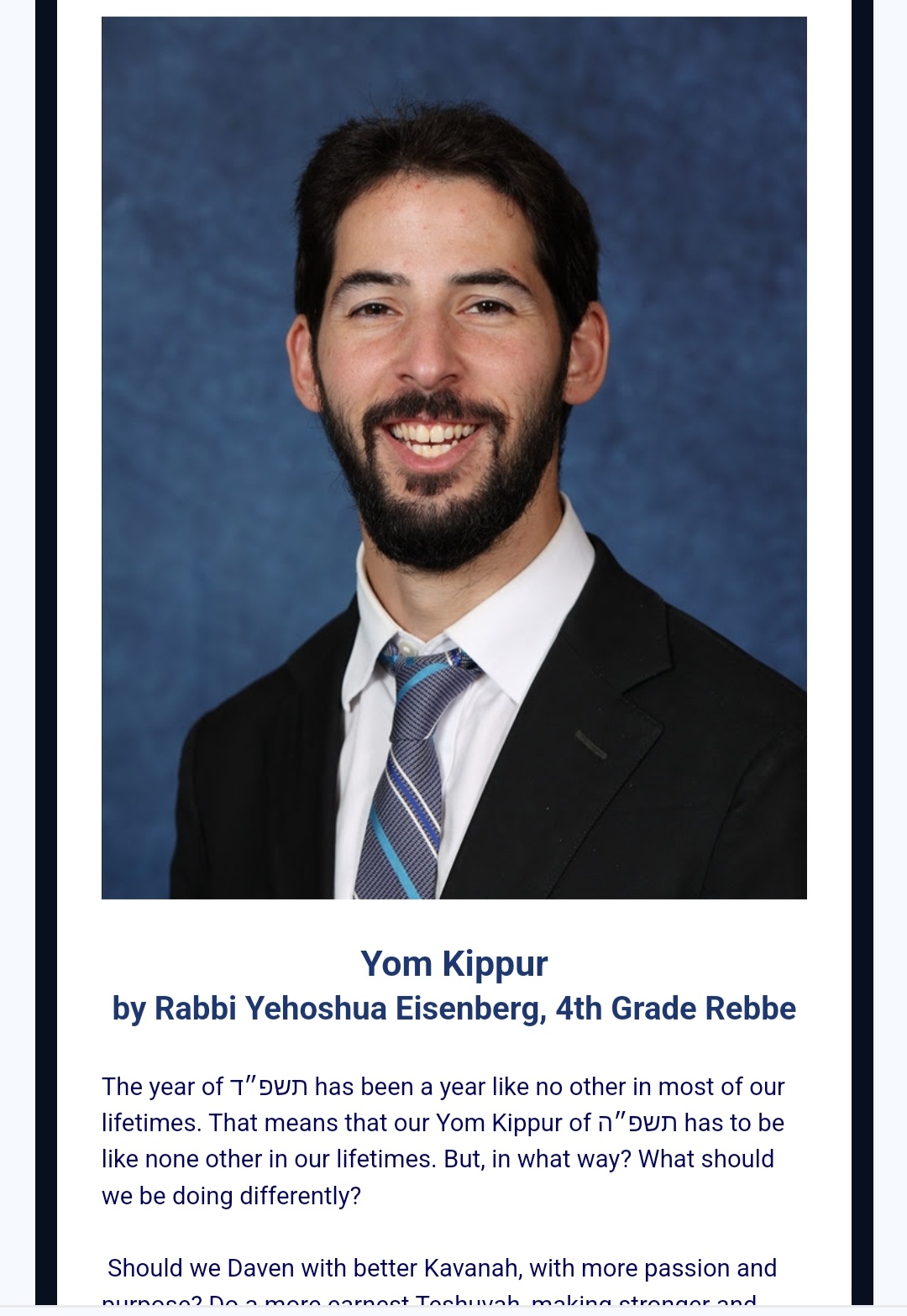בס״ד
יוֹם כִּיפּוּר
Rabbi Yehoshua Eisenberg, 4th Grade Rebbi
The year of תשפ״ד has been a year like no other in most of our lifetimes. That means that our Yom Kippur of תשפ״ה has to be like none other in our lifetimes. But, in what way? What should we be doing differently?
Should we Daven with better Kavanah, with more passion and purpose? Do a more earnest Teshuvah, making stronger and maintainable commitments?
Surely, we should be doing all of the above. There are many correct answers and probably even more incorrect answers to this question. But, following the first English anniversary of the horrors of October 7th, I want to recommend a suggestion and draw some inspiration from our חַיָלִים and קְדוֹשִׁים, those still living in this World, and those who have graduated to the Next World, those we lost this year, and all the years past.
What can we do for them? How can we help them? We can Daven and learn for them, yes. We can do Teshuva, Chessed, and give Tzedakah in their merit, yes. These are all the best options. But, perhaps the most meaningful thing that we can do in their merit is to emulate them in our service of Hashem and Am Yisrael. What are they doing that we may not be doing? What is it that they are occupied with that makes us at home feel so inadequate and not helpful?
Our חַיָלִים and קְדוֹשִׁים are engaged in unmistakeable מְסִירַת נֶפֶשׁ (self-sacrifice). They have and continue to make that ultimate sacrifice “Al Kiddush Hashem,” literally, in sanctification of Hashem’s Holy Name. Whether they survive physically or perish is not the question. Whatever they are doing, they are dying, living, breathing, and existing “Al Kiddush Hashem.” When we hear a story of hostages’ lives taken or about wounded and fallen soldiers, we feel almost guilty that it was not us. Why couldn’t I bring myself and position myself to make the ultimate sacrifice for Hashem and my people? But, what if there is a way in which we can?
On Yom Kippur, we are positioned, in a sense, to “emulate” the ultimate sacrifice for Hashem and His people.
We “afflict” ouselves by refraining from eating, drinking, and indulging in material pleasures. We detach ourselves from our physical beings, from the physical world. All the while, we dress in white, each man in his קִיטוּל, yes, to resemble angels, but also to resemble a person in תַּכְרִיכִים, burial shrouds.
We recite the same וִידוּי (confession) that one does at the end of his life when he knows that he will be imminently leaving this world. That is because we literally do not know if our time on this world is up. Hashem is “still deciding.” Similarly, the Kohein Gadol entered the Kodesh HaKadashim to intercede on behalf of Am Yisrael not knowing if he would come out alive. He readies himself for the ultimate sacrifice.
In the special Shmoneh Esreih of Rosh HaShannah and Yom Kippur, we begin the third Bracha with the words “וּבְכֵן תֵּן פַּחְדְּךָ.” The Tur and Avudraham explain that the word “וּבְכֵן” is borrowed from Queen Esther who declared, before entering before King Achashveirosh (Esther 4:16), “וּבְכֵ֞ן אָב֤וֹא אֶל־הַמֶּ֨לֶךְ֙ אֲשֶׁ֣ר לֹֽא־כַדָּ֔ת וְכַֽאֲשֶׁ֥ר אָבַ֖דְתִּי אָבָֽדְתִּי…”-“…and with thus, I shall come to the King unlawfully, and that if I have perished, so I have surely perished.” Esther too readied herself for the ultimate sacrifice.
Who could have known what this past year would bring? Who can say that he or she knows what next year will bring? How does one know whether or not the coming year will be one’s last? How often do we meditate on the reality that life and death are in Hashem’s hands alone?
And if that is all true, what is our Avodah? What is our purpose? To mentally and emotionally prepare ourselves with a readiness to exist “Al Kiddush Hashem.” We have no way of knowing “who will live and who will die.” But, whichever it is, we have the choice to do so “Al Kiddush Hashem,” to live or even die, Chas V’Shalom, in service of Hashem and His people. We can’t control life and death, but can choose to entirely dedicate our lives to Hashem’s Torah and nation.
When we take our three steps into the תְּפִילוֹת of Yom Kippur and enter the heavenly courtroom, we should do so like the Kohein Gadol and Esther HaMalkah entering before the King, like Avraham and Yitzchak on the way to the Akeidah, like our חַיָלִים and קְדוֹשִׁים on the battlefield, all with a sense of מְסִירַת נֶפֶשׁ (self-sacrifice), with a profound readiness to wholly give our lives over to Hashem and His people.
We should all be Zocheh to be sealed in the Sefer HaChaim Tovim, the Book of Good Life, and to live every day “Al Kiddush Hashem.”

